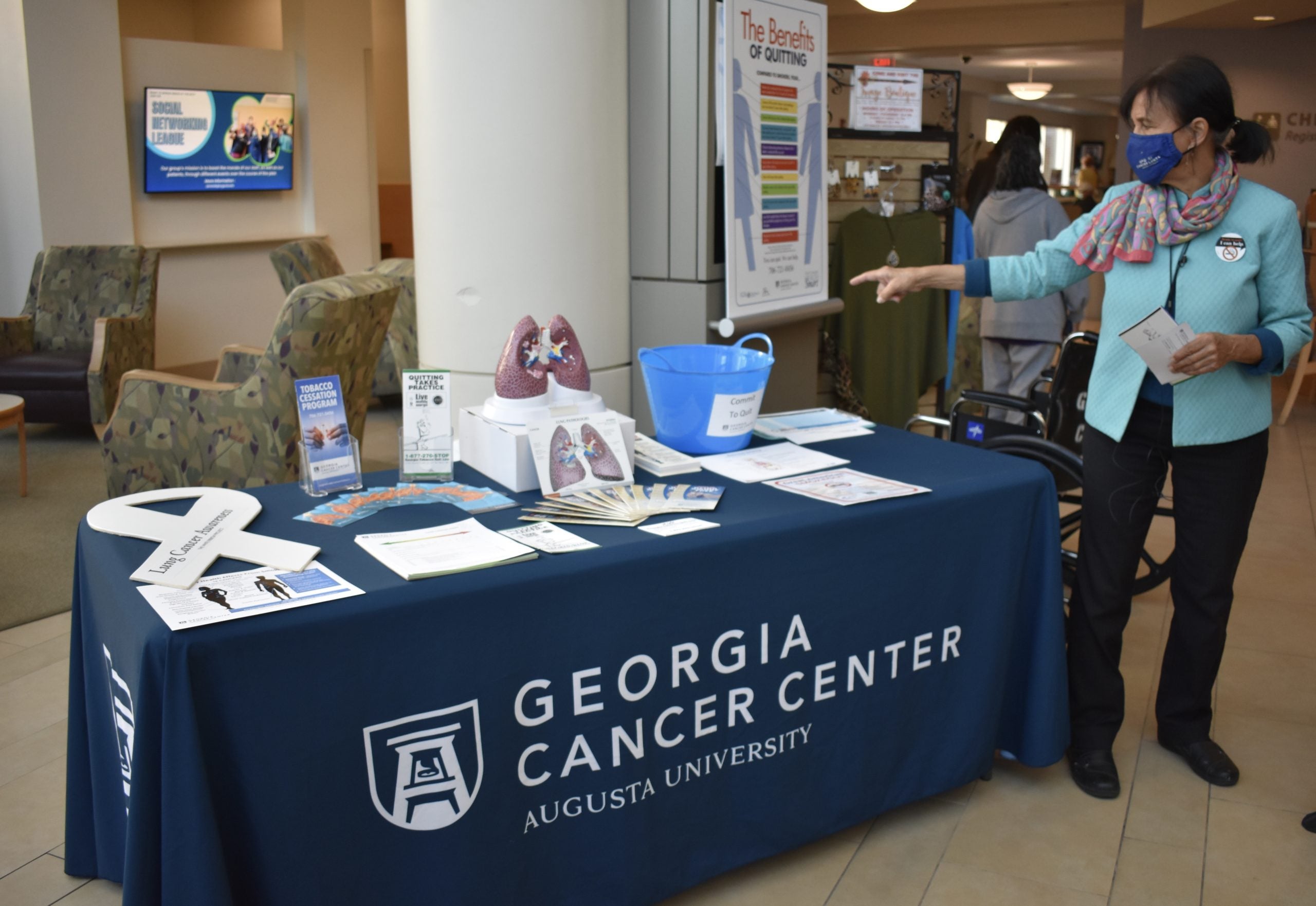In celebration of November being Lung Cancer Awareness month, the Georgia Cancer Center is taking multiple measures to fight against contributing factors to the disease.
Following the recent $10 million expansion of the Georgia Cancer Center’s Radiation Therapy building, three “Commit to Quit” stations were set up on Thursday, Nov. 17, to help spread awareness about the dangers of vaping and smoking.
The three stations were located inside the Children’s Hospital of Georgia, the Georgia Cancer Center Outpatient Clinic and the Medical Office Building at Augusta University’s Health Science campus.
Nationally, the third Thursday of November is recognized as the Great American Smoke-out by the American Cancer Society to encourage others to start their journey towards a tobacco-free life.
To advertise the Great American Smoke-out day, Community Outreach Coordinator Christine O’Meara and others with the center worked to inform people on why everyone should quit smoking.
According to O’Meara, lung cancer is the leading cause of cancer deaths in the U.S., and smoking heavily contributes to one’s risk of developing cancer later in life. For her, spreading this information is about saving lives – one educational chat and pamphlet at a time.
“We’re hoping to raise awareness of tobacco and smoking, as well as to let people know that it’s never too late to quit,” she said.
O’Meara said around 480,000 people die of lung cancer every year; more than 11,000 of those deaths occur in Georgia and are linked to smoking.
MORE: Newborn’s life saved by specialist treatment at Children’s Hospital of Georgia
Equally important, she said people who choose to continue smoking should not put others in danger of cancer with secondhand smoking – especially children.
“Secondhand smoke is also, for people who do not smoke, a cause of lung cancer,” she said. “We want to minimize the cigarette smoke around other people. Secondhand smoke not only can cause cancer, but it can also introduce asthma, ear infections and allergies in children.”
Although studies have not yet proven vaping as a direct cause of lung cancer, O’Meara said there are other dangers e-cigarettes cause. According to her, vape products that incite children and young adults, such as fruity and candy flavoring, not only act as a gateway drug, but also introduce chemicals into the body that lowers lungs’ ability to detoxify and get rid of inhaled particles.
This lowered ability to expel microorganisms can lead to the development of different diseases.
“I think that teenagers and young adults are just not aware of the dangers of e-cigarettes. They can kill you,” she said. “E-cigarettes have cancer causing chemicals like formaldehyde and benzene.”
O’Meara said there have even been deaths surrounding the product such as exploding vapes and children drinking the flavored liquid after finding them.
“Those are rare cases, but they happen,” she said. “Young people think they are harmless and that’s not the case.”
Equipped with visual aids of damaged pig lungs, O’Meara also coordinated some of the center’s respiratory therapy students to present at the Academy of Richmond County to warn them of long term effects of vaping as it has become a popular problem.
“One juul pod or huff bar from an e-cigarette has enough nicotine that is the equivalent to 20 cigarettes,” she said. “One of the side effects is seizures because of the high levels of nicotine in them.”
While many young users cite stress and anxiety relief as a reason for usage of vapes, O’Meara said it is a short term chemical reaction caused by the nicotine. However, after the nicotine effects have faded, it trains users to get in the habit of going back and “taking another hit;” this back and forth cycle is what causes addiction in the long run and diverts young people from engaging in healthier manners of dealing with mental or emotional stresses.
“There are many healthy ways to reduce your stress and anxiety,” said O’Meara. “Maybe talking with someone about how you’re feeling.”
Amidst the table full of information packets and resources regarding tobacco usage dangers, O’Meara also recounted the story of 17-year-old Daniel Ament who underwent a double lung transplant due to vaping-related damage. Famous teen from Michigan, who nearly lost his life due to a vape pen, was extremely athletic prior to his emergency procedure and is just one example of the major side effects e-cigarettes can cause.
MORE: Lung cancer month marked at Augusta University
To prevent future cases like Ament’s, O’Meara recommends parents educate themselves and their children, while also being on the lookout for signs that one’s child is vaping or smoking.
“Do they smell like fruity flavors? Have they found a juul pod or a puff bar? Or something that looks like a vape or a vape pen, because they have clever disguises,” she said.
O’Meara suggests long term users, who are 18 years or older, get screened for lung cancer at the center to start being proactive about their health.
For teens and young adults, she recommends they contact a help line to coach and remind them throughout their journey, or get friends involved in order to encourage and motivate each other.
Free services, such as online help lines and text reminders, are resources that O’Meara said have evidence based results. But group and counseling programs, such as the Tobacco Cessation Program and the Georgia Tobacco Quit Line, have also proven to be quite effective for those who wish to quit living a tobacco dependent life.
“This is about saving lives,” she said. “There is no safe tobacco product, and it doesn’t take that much nicotine to become addicted. Anytime you are bringing foreign substances into your lungs that’s compromising your lung health.”
For more information on lung cancer or the effects of smoking, visit: https://www.augustahealth.org/cancer-care/lung-cancer
For resources to quit tobacco usage, visit: https://www.cdc.gov/tobacco/quit_smoking/index.htm
Liz Wright is a staff writer covering education and general assignments for The Augusta Press. Reach her at liz@theaugustapress.com












